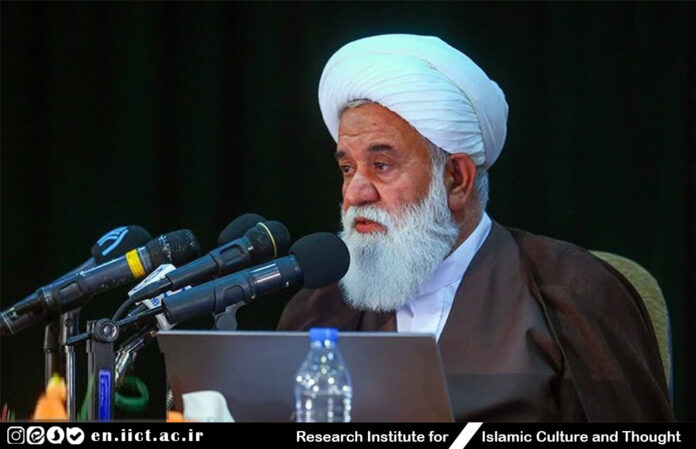According to the report of public relations department of the Institute of Islamic Culture and Thought, Ayatollah Ali Akbar Rashad, at the closing ceremony of the third conference of “Islamic Humanities, Research and Technology” held in the hall of G.Soleimani of the Institute, in an online speech, emphasized on the need to divide activities in the procedure of Islamic-Humanities production said: With a precise agenda and division of activities among research institutes, we can help improve the position of Islamic-Humanities.
He added that: About “humanities”, we have for years had the issues of modification, promotion, damage, production, development, propagation and application of this vast field on our plans, and our wise, smart and futuristic leader is also interested and regularly addresses this issue during his speech and meetings.
The head and founder of the institute continued: most of the institutions, especially the institutions present in this meeting, are also taking care of this issue, but since we are facing a series of challenges, things do not proceed as fast as they should.
He stated: “After several decades of study and discussion over this topic, we are still busy with previous discussions, that is, we are still talking about the necessity of it, we are talking about the possibility of it, we are talking about the usefulness and necessity of humanities, while we should We have passed this stage.
Ayatollah Rashad further added: taking a step forwards, and we are still stuck in a series of general discussions: Abstract theoretical discussions and perhaps added philosophies (philosophies of) to these sciences, theoretical, abstract and philosophical discussions and general principles related to the humanities in general, also some common discussions between these fields, and if we discuss in a specific field, we finally come to realize have studied the previous discussions that were addressed [before and by others].
He stated: Perhaps the solution or at least the most important one is the what Dr. Lakzai said, that we do a national division of studies and activities in this field, and the common aimed institutes, address and share these ten or twenty sciences. Then we share the knowledge together, if possible, each institute accepts only one of the fields, unless it wants to study more fields.
The CEO of the council of seminaries of Tehran province stated: In every field, we must tell the institute in charge, that this field is particular to you, and you are held responsible. We must set up a schedule and deadline, define a process, measure performance annually, and if we do this, it seems we will be able to achieve a predictable estimate, critique and evaluation in a certain amount of time and platform.
Addressing the members of the Humanities-Islamic Sciences Association, he said: Currently, none of us can claim where we are located in this ongoing process or where each of us will have reached after ten years.
Ayatollah Rashad stated that “specialized polarization” should be done and further said: we must be able to say that a particular institute is the pole of a certain area of studies and so on. Then we should devise “general principles in a pattern” so that everyone works and studies based on that pattern. for instance, in the science production, we should design a process that we all work together according to that, step by step.
He added that: We should turn the “annual humanities-Islamic science conference” into an “annual performance measurement club”, which has a cross section point of view, to see where we have reached as a whole, and also has a section view, where we can see where each institute has reached.
The head of the Research Institute of Islamic Culture and Thought stated that we have worked in the field of culture in this research institute and said: We have conducted extensive work and research on the concepts of “cultural structure” and “resistance culture” and we can report where we were last year and where we have reached now.




